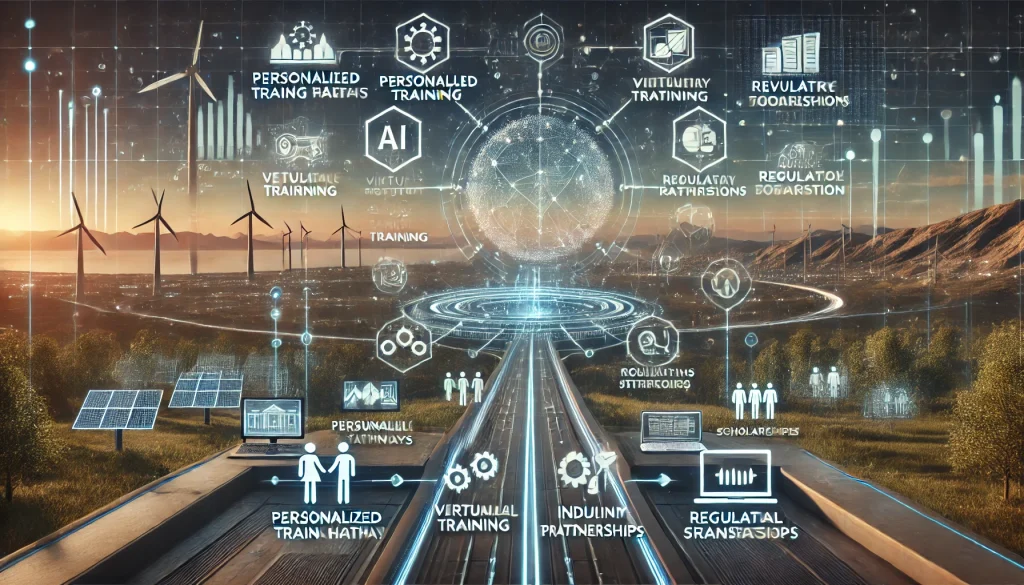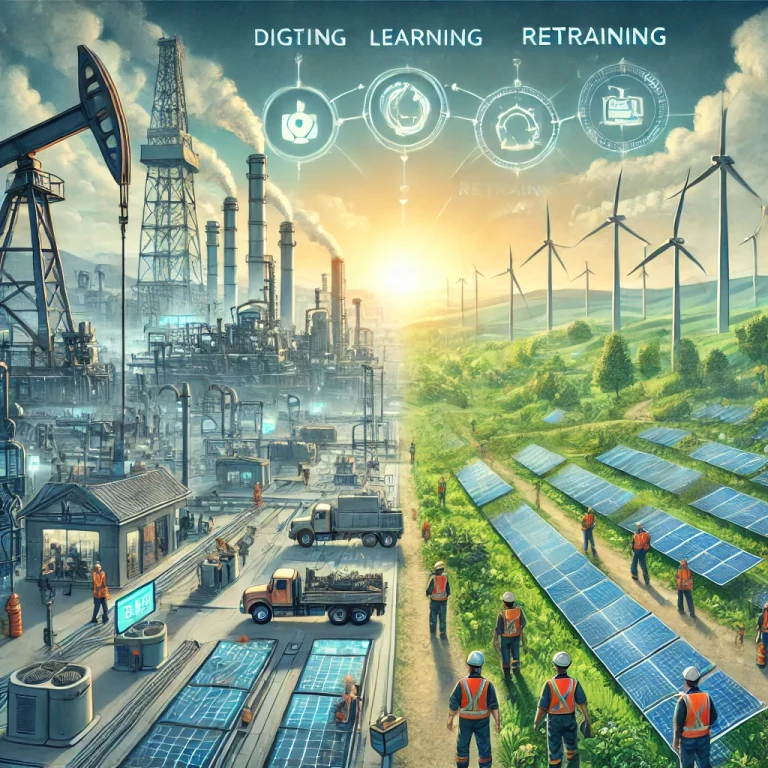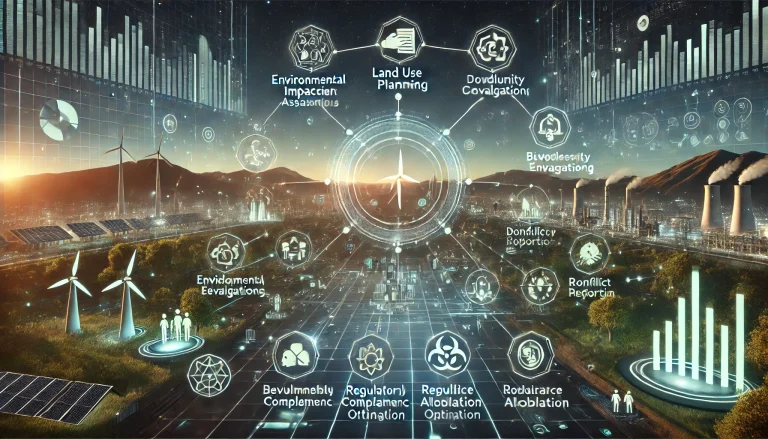Problem Statement
The transition from conventional to renewable energy sources necessitates a significant shift in the workforce. Conventional energy workers may need retraining and upskilling to adapt to new technologies, while the renewable energy sector faces a shortage of skilled labor. Addressing these workforce challenges is crucial for the successful transition to sustainable energy solutions.
Pain Points
- Skill Mismatch: Existing skills of conventional energy workers do not match the requirements of renewable energy technologies.
- Labor Shortage: Insufficient number of skilled workers in the renewable energy sector.
- Training Programs: Lack of accessible and comprehensive training programs for upskilling.
- Technology Adaptation: Resistance to adopting new technologies among conventional energy workers.
- Funding for Training: Limited funding and resources for developing and delivering training programs.
- Regulatory Compliance: Ensuring training programs meet industry standards and regulatory requirements.
- Job Security Concerns: Fears of job loss and instability among conventional energy workers.
- Workforce Mobility: Difficulty in transitioning workers geographically and between sectors.
- Retention of Skilled Workers: Challenges in retaining skilled workers in the renewable energy sector.
- Awareness and Outreach: Lack of awareness about career opportunities in the renewable energy sector.

Future Vision
Our platform envisions a future where the workforce transition in the energy sector is seamless, with comprehensive training and upskilling programs that bridge the gap between conventional and renewable energy skills. Leveraging AI, VR, and online learning, the platform will offer personalized training pathways, real-time progress tracking, and industry-recognized certifications. Our vision is to create a resilient and adaptable workforce that supports the growth of renewable energy while ensuring job security and career advancement for conventional energy workers.
Use Cases
- Personalized Training Pathways: AI-driven customized training programs based on individual skill assessments.
- Virtual Reality Training: VR simulations for hands-on experience with renewable energy technologies.
- Online Learning Platforms: Accessible online courses and modules for upskilling and certification.
- Industry Partnerships: Collaborations with energy companies and educational institutions for practical training.
- Real-Time Progress Tracking: Tools for monitoring training progress and competency development.
- Regulatory Compliance Training: Courses ensuring compliance with industry standards and regulations.
- Career Transition Support: Services for job placement and career counseling in the renewable energy sector.
- Funding and Scholarships: Resources and funding options for accessing training programs.
- Community Outreach: Initiatives to raise awareness about career opportunities in renewable energy.
- Retention Strategies: Programs to retain skilled workers through continuous learning and career development.
Target Users and Stakeholders
- User: Energy Sector Workers and Training Providers
- Age Group: 20-60 years
- Gender: M/F
- Usage Pattern: Regular usage for training, upskilling, and career development
- Benefit: Enhanced skills, job security, and career advancement
- Stakeholders:
- Energy Companies: Businesses in both conventional and renewable energy sectors
- Training Providers: Educational institutions and training organizations
- Government Agencies: Bodies overseeing workforce development and energy transition
- Investors: Entities funding training programs and renewable energy projects
- Workers: Employees in the energy sector seeking training and upskilling opportunities
Key Competition
- Coursera: Offers online courses and certifications for various skills, including renewable energy.
- Udacity: Provides nano-degree programs focused on technology and industry-specific skills.
- LinkedIn Learning: Offers a wide range of professional development courses.
- edX: Provides access to courses from top universities and institutions.
- Skillshare: Platform for creative and technical skill development.
Products/Services
- Coursera for Business: Customized training programs for organizations.
- Udacity Nanodegrees: Industry-specific skills training and certification.
- LinkedIn Learning: Professional development courses for career advancement.
- edX Professional Certificates: Certifications from leading universities and institutions.
- Skillshare Teams: Group plans for team skill development.
Active Startups
- ReSkill: AI-powered platform for workforce training and upskilling.
- LearnUpon: Learning management system (LMS) for corporate training.
- NextEnergy: Focuses on training programs for renewable energy technologies.
- Flockjay: Provides training and job placement in tech sales, including renewable energy sectors.
- Udemy for Business: Corporate learning platform with a vast library of courses.
- Grovo: Microlearning platform for employee training and development.
- Alison: Free online courses and certifications for various industries.
- Trainual: Simplified training and onboarding platform for businesses.
- Skillsoft: Provides digital learning solutions for corporate training.
- Go1: Offers curated online learning content for workforce development.
Ongoing Work in Related Areas
- AI and Machine Learning: Enhancing personalized training pathways and skill assessments.
- Virtual Reality: Developing immersive training simulations for hands-on learning.
- Online Learning Platforms: Expanding access to quality training programs.
- Workforce Mobility Solutions: Facilitating the transition of workers between sectors and geographies.
- Career Counseling and Job Placement: Providing support for career transitions and job placements in the renewable energy sector.
Recent Investment
- ReSkill: $10M in Series A funding led by XYZ Ventures, May 2021.
- LearnUpon: $56M in Series B funding led by Summit Partners, October 2020.
- NextEnergy: $5M in seed funding led by Renewable Energy Ventures, March 2021.
- Flockjay: $11M in Series A funding led by Lightspeed Venture Partners, January 2021.
- Udemy for Business: $50M in Series D funding led by Benesse Holdings, February 2020.
Market Maturity
The market for workforce training and upskilling in the energy sector is rapidly evolving, driven by the need to transition from conventional to renewable energy sources. Significant investments in AI, VR, and online learning platforms are transforming the industry, with both established companies and innovative startups leading the way. As the market matures, more integrated and advanced platforms are expected to emerge, supporting the seamless transition and upskilling of the energy workforce.
Summary
The transition from conventional to renewable energy sources necessitates a significant shift in the workforce. Conventional energy workers may need retraining and upskilling to adapt to new technologies, while the renewable energy sector faces a shortage of skilled labor. Our proposed platform leverages AI, VR, and online learning to provide comprehensive training and upskilling programs. Key pain points include skill mismatch, labor shortage, lack of training programs, technology adaptation, funding for training, regulatory compliance, job security concerns, workforce mobility, retention of skilled workers, and awareness and outreach.
Target users include energy sector workers and training providers, with stakeholders encompassing energy companies, training providers, government agencies, investors, and workers. Key competitors like Coursera, Udacity, LinkedIn Learning, edX, and Skillshare offer various professional development and training solutions. Active startups such as ReSkill, LearnUpon, NextEnergy, Flockjay, and Udemy for Business are driving innovation in this space. Recent investments highlight significant interest and growth potential in workforce training and upskilling technologies.
By addressing these challenges and leveraging advanced technologies, our platform aims to create a resilient and adaptable workforce that supports the growth of renewable energy while ensuring job security and career advancement for conventional energy workers.



